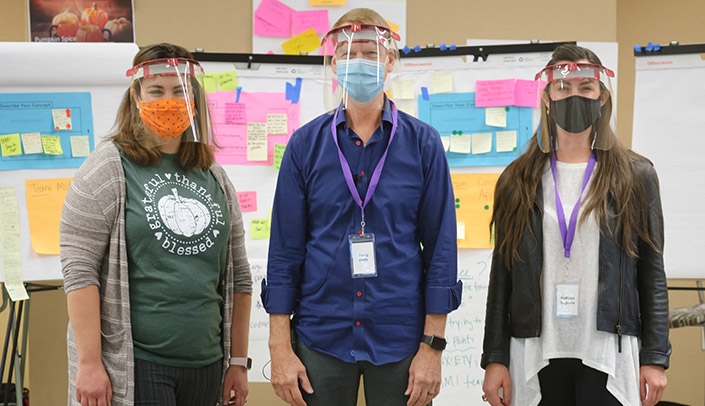An interprofessional group of faculty, staff and students from UNMC, Nebraska Medicine, UNO and Clarkson College took part in a Design Thinking Boot Camp on Oct. 26-28.
Throughout the camp, led by Kathryn Segovia, PhD, director of the design thinking program at Stanford, and Douglas Dietz, principal design thinker for GE Healthcare, participants learned how to use the design thinking process to solve complex problems by first developing deep empathy for the people they were solving the problem for – understanding who they are and what is important to them.
"Design thinking gives teams a new approach and a renewed energy for solving ambiguous challenges," Dr. Segovia said.
Participants were presented with a challenge from Jennifer Kallio, DDS, one of the event leaders and assistant professor in the adult restorative department at the UNMC College of Dentistry: How to provide the best dental patient experience in the country for people with disabilities. This real-world challenge was well-timed; the College of Dentistry is opening a dental clinic in the Munroe-Meyer Institute in 2021 where they will be serving patients with disabilities.
On the first day of the camp, participants were split into teams that were led by coaches with training in design thinking. The teams met with caregivers of children with disabilities to understand their experiences, beliefs and values concerning dental care for their children.
For example, one team met with a mother who has a 22-year-old son with Down syndrome. They uncovered that the mother felt guilty that her son still receives dental care from a pediatric dentist but worried about possible problems with transitioning his care to a dentist specializing in adults. She wanted to find a solution that allows her son to preserve his dignity and independence.
The teams then moved into the second stage of design thinking: defining the problem based on what they learned from the caregivers of children with disabilities and crafting a meaningful, actionable problem statement. The third stage was idea generation. Using the knowledge they gained in the first two stages, the teams looked for alternative ways to view the problem and identify innovative solutions. During the fourth stage, the teams tested prototype solutions and solicited feedback from a group of stakeholders to help them arrive at their final solutions.
During the final stage, the teams presented refined versions of their solutions to stakeholders and the other teams. A common theme among the solutions was customizing the patient experience to the unique needs of the patient. The solutions were judged based on the teams’ insight into the problem and the potential value of their concepts.
"The winning solution involves working with the patient and their family to develop a personalized care and transition plan that spans the patient’s life with the goal being to preserve the patient’s dignity and independence," said TJ Welniak, MD, assistant professor in the UNMC Department of Emergency Medicine, who teamed up with Dele Davies, MD, senior vice chancellor for academic affairs at UNMC to serve as design thinking coaches for the winning team.
"This outcome is a perfect example of how interprofessional teams at UNMC can work together to use design thinking to solve complex problems. Design thinking is an important component of UNMC’s strategic plan; UNMC has the potential to be the leading health science institution in design thinking. We will continue to build a culture where we use this problem-solving approach to find innovative solutions to many kinds of challenges," Dr. Davies said.
Janet M. Guthmiller, DDS, PhD, dean of the UNMC College of Dentistry, was grateful for the participants’ efforts and thoughtfulness.
"The teams gave us many good ideas and a lot to think about. We are people of action at the College of Dentistry; we will integrate elements of many of the solutions into the experiences we offer our patients with disabilities, as well as the experiences we offer all the patients we serve in our College of Dentistry clinics."
Likewise, the participants were grateful for the experience.
"It was inspiring to be immersed in a purposeful project and work with an interprofessional team. I appreciate that UNMC is so forward thinking and has prioritized design thinking," said Betsy Becker, PhD, chair of the health & rehabilitation sciences department at the UNMC College of Allied Health Professionals. "My next step is to take the knowledge I’ve gained and work with my colleagues at the College of Allied Health Professionals to determine future design thinking projects."
The impact of this boot camp will extend across UNMC. Many of the people who were involved are members of the UNMC Interprofessional Academy of Educators (IAE), including event leader, Dr. Jennifer Kallio.
"The IAE has a new special interest group for design thinking for our members. When interprofessional teams work together, they bring a variety of perspectives and ideas to the table, which helps make the design thinking process very effective," Dr. Kallio said. "The IAE hopes to help build a culture where teams throughout UNMC can use design thinking to find solutions to many types of challenges."
